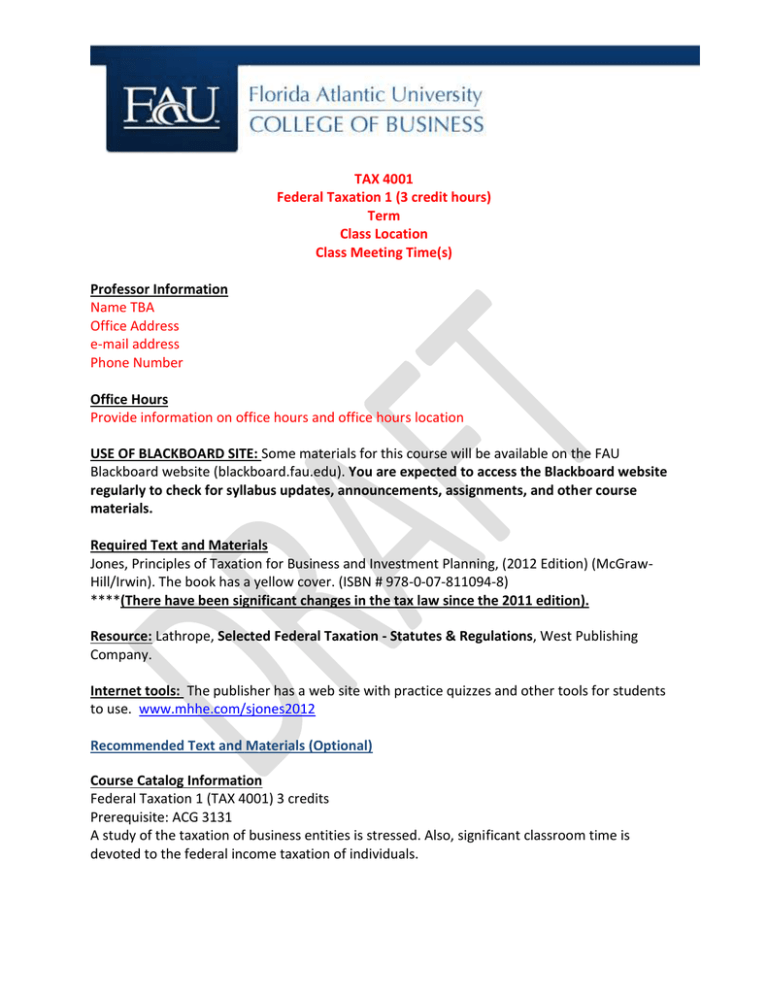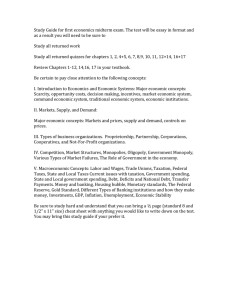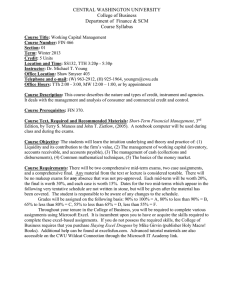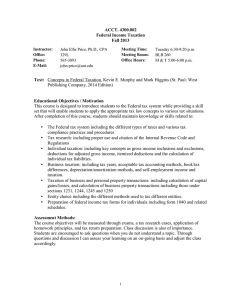TAX 4001 Federal Taxation 1 (3 credit hours) Term
advertisement

TAX 4001 Federal Taxation 1 (3 credit hours) Term Class Location Class Meeting Time(s) Professor Information Name TBA Office Address e-mail address Phone Number Office Hours Provide information on office hours and office hours location USE OF BLACKBOARD SITE: Some materials for this course will be available on the FAU Blackboard website (blackboard.fau.edu). You are expected to access the Blackboard website regularly to check for syllabus updates, announcements, assignments, and other course materials. Required Text and Materials Jones, Principles of Taxation for Business and Investment Planning, (2012 Edition) (McGrawHill/Irwin). The book has a yellow cover. (ISBN # 978-0-07-811094-8) ****(There have been significant changes in the tax law since the 2011 edition). Resource: Lathrope, Selected Federal Taxation - Statutes & Regulations, West Publishing Company. Internet tools: The publisher has a web site with practice quizzes and other tools for students to use. www.mhhe.com/sjones2012 Recommended Text and Materials (Optional) Course Catalog Information Federal Taxation 1 (TAX 4001) 3 credits Prerequisite: ACG 3131 A study of the taxation of business entities is stressed. Also, significant classroom time is devoted to the federal income taxation of individuals. This course is designed to be a comprehensive introduction to the federal income tax system ranging from taxation of individuals, pass-through entities to corporations. A study of the taxation of business entities is stressed. Also, significant classroom time is devoted to the federal income taxation of individuals. The course will be primarily lecture format with frequent use of homework problems to supplement the lecture. Supplemental Course Description PREREQUISITES: Junior standing, 6 hours of accounting principles, and ACG 3131 WITH A PASSING GRADE OF A “C” are prerequisites for this course. Students lacking proper prerequisites may be administratively withdrawn from this or any other accounting course at any time during the term without receiving a tuition refund and without being notified in advance. Course Learning Objectives The objective of the course is to provide the student with a basic knowledge of U.S. income Taxation as it applies to individuals and other entities. Upon completion of this course, you should be capable of fulfilling your roles as an informed citizen who understands our federal tax system and can make educated judgments about proposed legislative changes to the system and the effect of taxation on individuals and businesses alike. You should also be on your way to become an effective business manager or consultant who can understand and manage the tax costs/ savings of alternative business decisions. LEARNING OUTCOMES: 1. Explain the nature of taxation, the types of taxes and rate structures. Explain the concept of tax planning and how taxes affect business transactions. 2. Explain the concept of taxable income and the affect thereon from accounting methods, elections and tax law. Identify the sources of differences between book and taxable income, including temporary and permanent differences. 3. Explain the tax treatment of various types of long-lived assets, including depreciation, amortization, and cost of goods sold. 4. Explain the concept of tax basis. Calculate gain or loss from disposition of long-lived assets including the recapture rules of Sections 1245, 1250, 291 and 1231. 5. Calculate gain or loss realized and recognized on various tax deferral situations with long-lived assets such as Section 1031 exchanges, casualties and involuntary conversions. 6. Explain the tax issues related to creating new businesses, including sole proprietorships, partnerships, corporations, etc. 7. Discuss basic corporate tax rules, basic partnership tax rules and basic S corporation tax rules. 8. Explain the concepts of gross income, adjusted gross income and taxable income for individual taxpayers. Calculate individual taxes from the tax rate schedules. 9. Explain the rules for taxation of different types of income including wages, interest, dividends and capital gains. 10. Differentiate between capital gain income and other types of income including the carry over rules for capital losses. 11. Explain the various categories of deductions included in itemized deductions. 12. Calculate and explain various tax credits including the child credit and dependent care credit. 13. Explain the alternative minimum tax. Calculate the amt exemption and the amt. 14. Explain the different types of retirement accounts allowed under the tax law including the eligibility requirements, annual maximum contributions and results of withdrawal. Grading Scale Exams: There will be four CLOSED-BOOK exams including a COMPREHENSIVE FINAL EXAM. You will be allowed to bring a single 8 ½ x 11 piece of paper (font no smaller than 10) with notes. This paper must be turned in as part of your exam. Tax tables and discount rate tables will be provided. The highest score on 2 of the first 3 exams will count. All students MUST take the final exam. Therefore you may drop the lowest score (of the first 3 exams). Homework: During the course of the semester, a student may earn up to 100 points for homework. For each chapter, homework problems will be assigned. During class time we will go through some, but not every homework problem. Dates and assigned problems will be announced in advance during class and also posted on Blackboard. Each time we do homework problems, students can earn 10 points for indicating they are ready to discuss the homework assignments. AT THE BEGINNING OF EACH CLASS (once class has started- NO FURTHER NAMES WILL BE ALLOWED), students who are ready to discuss the homework assignments will identify themselves by placing their name in the homework envelope. All students who have indicated they are ready to assist with the homework by placing their name in the homework envelope PRIOR to the beginning of class will receive 10 points for that week. As we discuss the homework in class, I will randomly select names from those students who have indicated they are prepared to assist with the homework assignments (THIS MEANS YOU HAVE THOUGHT ABOUT AND ATTEMPTED TO SOLVE THE PROBLEMS- BUT DOES NOT MEAN YOU MUST HAVE THE CORRECT ANSWER). Students who are selected will hand in the homework for that specific problem. Based upon the students work and application of the concepts, he or she can earn up to an additional 15 points for that week. Further, the student selected should be able to assist with the homework assignments as answered in class. Preparation for presenting the solution and the approach to the solution will count towards the additional 15 points awarded. Students who are selected and are NOT able to assist with the homework assignments in class will lose 25 points for that week. Students may continue to accumulate points up to a maximum of 100 points for the semester. There is no way of knowing if you will be chosen for that week. Therefore, you should only indicate you are ready to assist with the homework in class if you are prepared. Those students who are not prepared, but have placed their name in the homework envelope take the risk that they will be selected and will lose the 25 points for that week. Assistance with homework means more than just reading the answer. I am aware that solutions to the problems exist on the Internet or from other sources. Therefore, if I feel that you are just reading an answer, you will be asked follow up questions to indicate your knowledge of the subject matter. Importantly, Assistance with homework does not mean the correct answer. It merely means you have looked at the homework and thought about the answer or how you would ask a question to determine the answer. GRADING Grading will be on a percentage basis. Points will be allocated as follows: Midterm Exams 200 points each ( top 2 of 3 scores) 400 points Final Exam- Comprehensive 400 points Homework/class participation 100 points Total Points Possible 900 points Course Evaluation Method Mandated Assessment Criteria: The State of Florida has mandated assessment procedures for all major programs. For the accounting major, Financial Reporting (ACG 3131), Managerial Decision Making and Accounting (ACG 3341), and Federal Taxation I (TAX 4001) are used to meet these requirements. Therefore, students in these classes will be required to meet the following additional criteria in order to successfully complete the course. This means that if you don’t get a 72% average on all the tests (based upon all tests- not individually) you may not pass the class regardless of you final average in the course. The grading scale is as follows: A 92% and above C 72 - 77% A- 90 - 91% C- 70 – 71% B+ 88 - 89% D+ 68 - 69% B 82 - 87% D 62 - 67% B- 80 - 81% D- C+ 78 - 79% F 60 - 61% 59% and below Select University and College Policies Code of Academic Integrity Students at Florida Atlantic University are expected to maintain the highest ethical standards. Academic dishonesty is considered a serious breach of these ethical standards, because it interferes with the university mission to provide a high quality education in which no student enjoys an unfair advantage over any other. Academic dishonesty is also destructive of the university community, which is grounded in a system of mutual trust and places high value on personal integrity and individual responsibility. Harsh penalties are associated with academic dishonesty. For more information, see University Regulation 4.001 at http://www.fau.edu/regulations/chapter4/4.001_Code_of_Academic_Integrity.pdf. ACADEMIC H0NESTY: Academic honesty is expected in all areas of the course (exams, group projects, etc.). Cheating will not be tolerated and violators will be punished to the maximum extent allowed under university guidelines. On tests and quizzes, please make every effort to cover your papers during each exam and keep your eyes only on your own work. This class enforces FAU’s honor code. ADA In compliance with the Americans with Disabilities Act (ADA), students who require special accommodation due to a disability to properly execute coursework must register with the Office for Students with Disabilities (OSD) – in Boca Raton, SU 133, (561) 297-3880; in Davie, MOD 1, (954) 236-1222; in Jupiter, SR 117, (561) 799-8585; or, at the Treasure Coast, CO 128, (772) 873-3305 – and follow all OSD procedures. Incompletes Note that an Incomplete is not a substitute for a poor grade and is rarely granted. In accordance with the policy of the College of Business, an Incomplete will be given only under the following circumstances: 1. The student is otherwise passing the course (at least a C). 2. The student has an excused absence that prevented the on-time completion of the course requirements. Withdrawals Any student who decides to drop is responsible for completing the proper paper work required to withdraw from the course. Important dates: Last day to withdraw with full refund is xxxx. Last day to drop a course without receiving an “F” is xxxx. Additional Course Policies CLASS POLICIES: 1. You are expected to come to class having (a) READ the text material assigned for that day and (b) ATTEMPTED ALL assignments. 2. Unless instructed otherwise, ALL work to be submitted for consideration toward your course grade is to be attempted and completed on an INDIVIDUAL BASIS. Religious Holidays. It is the responsibility of the student to promptly notify the professor of any conflicts due to religious observance so that accommodations can be arranged. Hurricanes. In the event of a hurricane warning or watch, the class will meet in accordance with the university policy. Classes cannot be individually cancelled by the instructor, although assignments and exams may be modified or postponed in the event of a hurricane. Students should monitor Blackboard announcements regarding any weather-related course issues. School of Accounting Policies You are responsible for School of Accounting policies at http://business.fau.edu/departments/accounting/school-of-accounting-policies/index.aspx. These policies are considered to be an integral part of this syllabus. Missing Exams Because of the ability to drop 1 of the first 3 exams-There are no make-up exams. ALL STUDENTS MUST TAKE THE FINAL EXAM. Late Assignments Attendance Policy Provide attendance policy Additional course policies as desired (Optional) – Note: additional course policies should not conflict with established University and/or College and/or School Policies. Examples include the following Etiquette and/or Netiquette Policy (Optional) Safe Assign (Optional) Written components of any assignment or project may be submitted to Safe Assign to evaluate the originality of the work. Any students found to be submitting work that is not their own will be deemed in violation of the University’s honor code discussed above. Course Outline Tentative Schedule for term: Week 1: 1/10, 1/12 Introduction; Chapters 1-5 Week 2: 1/17, 1/19 Chapters 1-5, Chapters 1-5* Week 3: 1/24, 1/26 Chapter 6, Chapter 6 * Week 4: 1/31, 2/2 EXAM 1 (chapters 1-6), Chapter 7, Week 5: 2/7, 2/9 Chapter 7*, Chapter 8 Week 6: 2/14, 2/16 Chapter 8*, Chapter 9 Week 7: 2/21, 2/23 Chapter 9*, Review Week 8: 2/28, 3/1 EXAM 2 (covers chapter 7-9), Chapter 10 3/6, 3/8 SPRING BREAK Week 9: 3/13, 3/15 Chapter 10*, Chapters 11 Week 10: 3/20, 3/22 Chapter 11*, Chapter 12 Week 11: 3/27, 3/29 Chapter 12*, Review Week 12: 4/3, 4/5 EXAM 3 (covers chapters 10-12), Chapters 14,17 Week 13: 4/10, 4/12 Chapters 14, 17, Chapters 14*, 17* Week 14 4/17 Week 14 4/19 Individual Tax Assignment Week 15 4/24 Review FINAL 4/26 7:45-10:15 AM Chapters 15, 16 (selected topics) homework for Chapters 15, 16 to be handed in *- Indicates an anticipated day to do homework assignments in class



